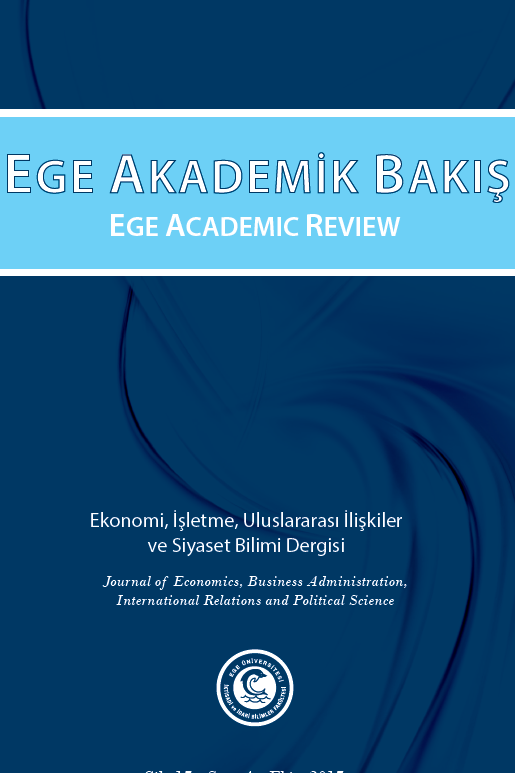İŞLETME DEĞERİNİ BELİRLEME YÖNTEMLERİ VE FARKLI SEKTÖRLERDEKİ İŞLETMELER ÜZERİNE BİR UYGULAMA
İşletme değerini belirlemede farklı yaklaşımlar bulunmaktadır. Bu yaklaşımlar kendi içinde farklılıklar göstermekle birlikte, nihayetinde en doğruya yakın bir işletme değerinin belirlenmesinde kullanılmaktadırlar. Bu çalışma işletme değerinin hesaplanmasında kullanılan yöntemleri değerlendirmeye yönelik bir çalışmadır. Bu bağlamda tanımlayıcı bir araştırma niteliğindedir. Bu çalışma, farklı sektörlerde faaliyet gösteren işletmelerin değerini belirlemeye yönelik bir incelemeyi içermektedir
The purpose of this article is determining calculation methods of firm value. The major theme of this study is that corporate performance with regard to assets is related to overall firm value. Adopting a financial strategy appears to significantly enhance corporate financial performance. In this context, there are different methods for calculating the firm value. This paper is an examination on firm value
___
- Berle, A. A. and G. C. Means, 1932, (Republished:1968): The Modern Corporation and Private Property. Larcourt, Brace & World Inc., New York
- Bhagat, S. and B. Black (2001): Board independence and long-term firm performance, Journal of Corporation Law 27, 231–273.
- Chibber, P. K. and S. K. Majumdar (1999): Foreign Ownership and Profitability: Property Rights, Control, and the Performance of Firms in Indian Industry, The Journal of Law and Economics
- Curcio Richard J. ve Wolf Fran M. (1996): Corporate Envıronmental Strategy: Impact Upon Fırm Value, Journal Of Financial And Strategic Decisions Volume 9 Number 2 Summer
- Demsetz, H. and K. Lenn (1985): The Structure of Corporate Ownership: Causes and Consequences, Journal of Political Economics Vol. 93.
- İvgen H.(2003): Şirket Değerleme, Finnet Yayınları
- Jensen, M. C. andW. H. Meckling (1976): Theory of the Firm: Managerial Behavior, Agency Costs and Ownership Structure, The Journal of Financial Economics 3, 305–360.
- Khanna, T. and K. Palepu (2000): Is Group Affiliation Profitable in Emerging Markets? An Analysis of Diversified Indian Business Groups, The Journal of Finance Vol.2, 867–891.
- Patibandla, M. (2002): Equity Pattern, Corporate Governance and Performance: A Study of Indian Corporate Sector. Copenhagen Business School, Working Paper, 2002.
- McConnell, J. J. and H. Servaes (1990): Additional Evidence on Equity Ownership and Corporate Value, The Journal of Financial Economics Vol.27, 595–612.
- Majumdar, S. K. (1998): Assessing Comparative Efficiency of the State Owned Mixed and Private Sectors in Indian Industry, Public Choice Vol 96, 1–24.
- Morck, R., A. Shleifer, and R. W. Vishny (1988): Management Ownership and Market Valuation – An Empirical Analysis, The Journal of Financial Economics Vol.20, 293–315.
- Ross S., Westerfield R., Jaffe J. (1996): Corporate Finance,Fourth Edition,
- Sarkar, J. and S. Sarkar (2000): Large Shareholder Activism in Corporate Governance in Developing Countries: Evidence From India, International Review of Finance Vol.1, 161–194.
- Taner B., Akaya G. C. (2004): Sermaye Piyasası, Faaliyet Alanı ve Menkul Kıymetler
- Weisbach, M. S. (1988): Outside directors and CEO turnover, Journal of Financial Economics Vol.20.
- Aylık Ekonomik ve Finans Dergisi, Eylül 2004
- HSBC Yatırım Menkul Değerler A.Ş.www.hscb.com.tr/hscbyatirim, 29.11.2004
- Gedik Yatırım Danışmanlığı: www.gedik.com, 29.11.2004
- İstanbul Menkul Kıymetler Borsası: www.imkb.gov.tr/veriler, 29.11.2004
- ISSN: 1303-099X
- Yayın Aralığı: Yılda 4 Sayı
- Başlangıç: 2000
- Yayıncı: Ege Üniversitesi
Sayıdaki Diğer Makaleler
TÜRK SİVİL HAVACILIK SİSTEMİNİN YAPISAL ANALİZİ
Vildan KORUL, Hatice KÜÇÜKÖNAL
ANALYTIC HIERARCHY PROCESS AS A MANAGERIAL DECISION TOOL IN THE EVALUATION OF NEW PRODUCT IDEAS
ÜNİVERSİTE REKTÖRLÜK SEÇİMİNE ALTERNATİF YAKLAŞIM VE DOKUZ EYLÜL ÜNİVERSİTESİ ÖRNEĞİ
LOJİSTİK SEKTÖRÜNÜN ÜLKEMİZDEKİ GELİŞİMİ ve REKABET VİZYONU
İŞLETME DEĞERİNİ BELİRLEME YÖNTEMLERİ VE FARKLI SEKTÖRLERDEKİ İŞLETMELER ÜZERİNE BİR UYGULAMA
